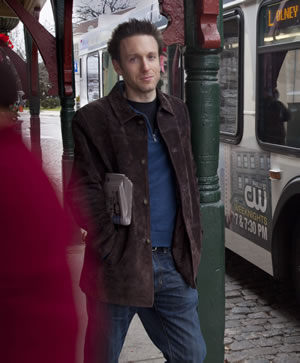|
You're a fiction writing professor. You've published a novel, and half a dozen short stories, and you've found clever ways to fluff up your bio. You think of your writing resume as one of the most creative pieces of fiction you've written. You get an adjunct gig at a good college. You have an office. You have a phone extension. You have voicemail and email and campus mail. In class, you allude to other courses you've taught, but when students ask you directly where you've taught, you say, "All over." The aspect of teaching you struggle most with is the idea that, as a teacher, you're an authority on writing. You don't feel like an authority on writing. To claim authority on writing seems like claiming authority on parenting or healthy living. The second you do that, the world will contrive to prove you wrong, to put you in your place, or at least that's what you believe, probably because you're Jewish.
But you're a fiction writing professor. You're here for a reason. It would be perhaps frustrating to students who have signed up for your course if, every time one asked a question, you threw up your hands and said, What do I know? You need to offer something. You need to wrangle a set of guidelines from what feels to you like your own desperate, manic-depressive, slap shot approach to writing fiction, where minor successes have been more the result of persistence or luck than skill. You have a hard time imagining how the things you've experienced or discovered, which seem abjectly personal, could be of use to another writer. You're aware that you can follow every single rule in the book, and still write a crappy story. You're aware of the constant disappointments of writing, of falling short again and again, of seeing ideas shrivel up or simply die. You're aware of the elusiveness of art, and that the aspects of a story or novel that take it from being good to great are mostly mysterious, inexplicable, magical, utterly original, and unrepeatable.
However, you're a fiction writing professor. This is a class. You need to provide a take-away. You say that fiction can be broken down into three main elements: plot, character, and language. Good. You say that we'll break the workshops down into these three areas. Good. You say that these are like the pistons that the engine of fiction runs on, or maybe the cylinders, and then you acknowledge that you have no sense of how an engine works and actually aren't sure how to open the hood of your car, so you shouldn't be using automotive metaphors. You say, The point is…and then realize you don't know. You say that plot is the easiest thing to talk about, the most straight-forward, but then acknowledge that plot generally isn't what makes a story great. So what is? It's the umami element you can't explain. Then why are you talking about it in a class? Why are you here?
Because you're a fiction writing professor. There are basic things you can explain that are helpful to beginning writers. For example: a metaphor compares an unfamiliar thing to something familiar. You might use the phrase the globe of his belly. His belly is unfamiliar, you say, but everyone knows what a globe looks like, so you're creating a clear picture in the reader's mind of this unfamiliar thing. Metaphors should be quick and sharp, you say, a vehicle to efficiently transport meaning from writer to reader. Then you think of one of your favorite passages in Bolaño, where a pause in conversation is described using a metaphor of a lake, a metaphor that begins one way, then backs up and starts another way, then qualifies and requalifies itself, then folds in and contradicts itself and finally darts off in a direction you never expected and aren't sure you even understand. So your rule isn't correct. Nor is what you said about not using mixed metaphors. What can you offer then?
Still, you're a fiction writing professor. You have a degree. You have a book. You have a website. Yet you're plagued by doubts about your own work, about the point or pointlessness of it, about whether you've ever written anything of value, and whether you'll ever do better. And so, as always, your thinking turns in on itself, and you find yourself alone, which is a kind of blank page, and though your helplessness scares you, and you say that the fear and the not knowing are the worst parts, you realize they are feelings you return to again and again, perhaps even love, because they make sense to you, because they offer the particular comfort of knowing exactly where you stand, and because at heart you're a writer.
|


